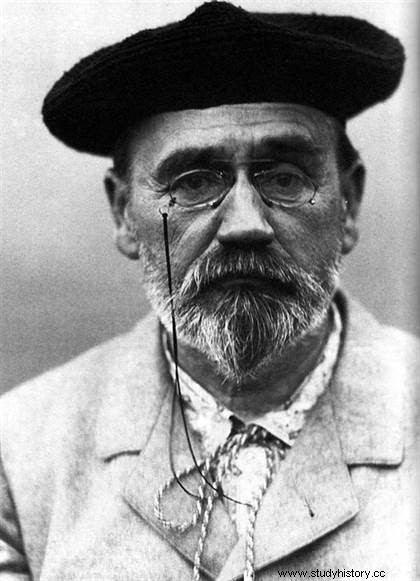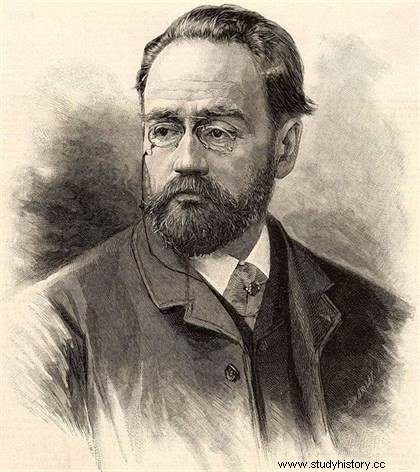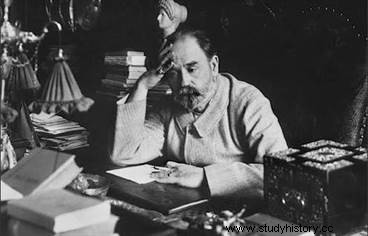 Short biography:Émile Zola (1840-1902) was a 19th century French novelist and precursor of naturalism in literature. Zola's most famous novels are the Rougon-Macquart (1871-1893), a twenty-volume saga that depicts the "natural and social history of a family under the Second Empire". A committed writer, he took sides in the Dreyfus affair, convinced of the innocence of the accused. He published in 1898 in the newspaper Aurore his famous open letter addressed to the President of the Republic, "J'accuse". Sentenced for defamation, he has no choice but to go into exile in England before being rehabilitated. His ashes will be transferred to the Pantheon in 1908, six years after his death.
Short biography:Émile Zola (1840-1902) was a 19th century French novelist and precursor of naturalism in literature. Zola's most famous novels are the Rougon-Macquart (1871-1893), a twenty-volume saga that depicts the "natural and social history of a family under the Second Empire". A committed writer, he took sides in the Dreyfus affair, convinced of the innocence of the accused. He published in 1898 in the newspaper Aurore his famous open letter addressed to the President of the Republic, "J'accuse". Sentenced for defamation, he has no choice but to go into exile in England before being rehabilitated. His ashes will be transferred to the Pantheon in 1908, six years after his death.
Émile Zola, a life marked by literature
Born on April 2, 1840, Émile Zola came from a bourgeois family in Aix-en-Provence, where he spent his childhood. At the age of two, he fell victim to a cerebral fever from which he recovered with difficulty. He has suffered after-effects, including speech problems, and will not be able to learn to read and write until he is eight years old. It was at this same time that his father died suddenly, plunging his family into a certain precariousness. This early loss will greatly inspire the future writer who will represent in his works an idealized figure of the missing father.
During his adolescence, Zola undertook studies in Paris during which he befriended the painter Paul Cézanne. A lover of poetry, Zola liked to travel around the capital on his walks, he who appreciated nature. After many family uncertainties, in 1859, he failed the baccalaureate test, thereby abandoning his studies and devoting himself to a bohemian life that was sometimes difficult for lack of income. His life was then punctuated by literature and reading by writing tales and poems (Contes à Ninon ).
 In 1862, he was employed at the publisher Hachette for four years and then was appointed head of advertising in 1864, a period during which he published his first chronicles. He collaborated with various newspapers as a literary critic and art critic, and joined the realist current of Gustave Flaubert and Guy de Maupassant and published his first important novel:Thérèse Raquin (1867).
In 1862, he was employed at the publisher Hachette for four years and then was appointed head of advertising in 1864, a period during which he published his first chronicles. He collaborated with various newspapers as a literary critic and art critic, and joined the realist current of Gustave Flaubert and Guy de Maupassant and published his first important novel:Thérèse Raquin (1867).
Zola and the Rougon-Macquart saga
Thereafter he devoted himself to the novel series of Rougon-Macquart , which is the natural and social history of a family under the Second Empire. It will be a colossal work of nineteen volumes, including La fortune des Rougon (1871), The Assomoir (1877), Nana (1880), Au Bonheur des dames (1883), Germinal (1885), The Human Beast (1890)... Leader of the naturalist school, Zola wants to apply in literature with the experimental novel the method of the biologists:the analysis of social determinism explains the behavior of the characters of his novels.
Émile Zola paints the diversity of Second Empire society, highlighting its harshness towards the workers, its turpitudes (Nana, 1880), but also its successes (the advent department stores in Au Bonheur des Dames, 1883). In a search for truth that takes scientific methods as a model, Émile Zola accumulates direct observations and documentation on each subject. Through his acute sense of detail "that rings true" and effective metaphor, through the rhythm of his sentences and his narrative constructions, he creates a powerful fictional world, inhabited by anguished questions about the human body and the social body.
After scouring the various publishing houses of the time for thirty years, and after having written a considerable amount of works, he took on the dimension of a writer who, scandalized by the situation of the Dreyfus affair was going to take his defense and give birth to the sphere of intellectuals under a third Republic threatened by the rise of nationalism and hatred between communities. The intellectual, today omnipresent and essential to public thought.
The Dreyfus Affair, the fight of an intellectual
The Dreyfus affair took place from 1894 to 1906, from the opening of the trial to the rehabilitation of Captain Dreyfus. It was all supposed to be a mundane spy affair. French intelligence intercepted a document (the famous "bordereau") proving that a French officer had betrayed his country for the benefit of Germany. An investigation was immediately opened and suspicion immediately fell on a Jewish officer, who was doing an internship at the general staff, Captain Dreyfus. Graphology experts are then appointed. Despite their contradictory conclusions, Alfred Dreyfus was arrested, following a very quick interrogation by Commander Paty de Clam, in charge of the investigation.
 On December 19, 1894, the trial opened behind closed doors before the court martial which pronounced the guilt of the accused four days later, in view of a "secret file", which Dreyfus' lawyer, Maître Demange, was never able to consult. Dreyfus was sentenced to deportation for life and transferred to the penal colony of Cayenne in Guyana. But first he had to suffer the supreme dishonour, degradation in public. This took place on January 5, 1895, in the large courtyard of the Military School., mourning the traitor,” writes Maurice Barrès.
On December 19, 1894, the trial opened behind closed doors before the court martial which pronounced the guilt of the accused four days later, in view of a "secret file", which Dreyfus' lawyer, Maître Demange, was never able to consult. Dreyfus was sentenced to deportation for life and transferred to the penal colony of Cayenne in Guyana. But first he had to suffer the supreme dishonour, degradation in public. This took place on January 5, 1895, in the large courtyard of the Military School., mourning the traitor,” writes Maurice Barrès.
It was in 1897 that Émile Zola began to side with Captain Dreyfus. He published in L'Aurore on January 13, 1898 a letter to the President of the Republic Félix Faure entitled:J'accuse. From February 17 to 23, the Ministry of War brought him to trial and he was sentenced to a fine of 3,000 francs and one year in prison. He went into exile in England from 1898 to 1899. When Dreyfus' innocence was finally demonstrated, Zola was pardoned and was able to return to France.
The death of Émile Zola
He died on September 29, 1902 in Paris, asphyxiated in mysterious conditions, apparently because of a criminal hand that blocked the chimney. On October 5, Zola was buried in the Montmartre cemetery, accompanied by a huge crowd. His ashes were transported to the Pantheon in 1908, making Zola an apostle of the French Republic and one of its emblematic figures along with Gambetta and Jules Ferry among many others.
Bibliography
- Zola, biography of Henri Troyat. Flammarion, Collection Grandes Biographies, 2002.
- Zola, a life, biography of Frederick Brown. Belfond, 1996.
- Émile Zola - from J'accuse au Panthéon, by Alain Pagès. Editions Lucien Souny, 2008.
